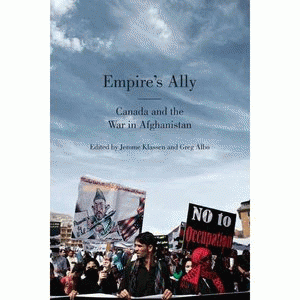Source: Dispatches From The Edge
Book Review
Empire's Ally: Canada and the War in Afghanistan
Edited by Jerome Klassen and Greg Albo
University of Toronto Press
Toronto Buffalo London 2013
Americans tend to think of Canadians as politer and more sensible than their southern neighbors, thus the joke: "Why does the Canadian chicken cross the road? To get to the middle." Oh, yes, bit of a "muddle" there in Afghanistan, but like Dudley Do Right, the Canadians were only trying to develop and tidy up the place.
Not in the opinion of Jerome Klassen and a formidable stable of academics, researchers, journalists, and peace activists who see Canada's role in Central Asia less as a series of policy blunders than a coldly calculated strategy of international capital. "Simply put," writes Klassen, "the war in Afghanistan was always linked to the aspirations of empire on a much broader scale."
"Empire's Ally" asks the question, "Why did the Canadian government go to war in Afghanistan in 2001?" and then carefully dissects the popular rationales: fighting terrorism; coming to the aid of the United States; helping the Afghans to develop their country. Oh, and to free women. What the book's autopsy of those arguments reveals is disturbing.
Calling Canada's Afghan adventure a "revolution," Klassen argues, "the new direction of Canadian foreign policy cannot be explained simply by policy mistakes, U.S. demands, military adventurism, security threats, or abstract notions of liberal idealism. More accurately, it is best explained by structural tendencies in the Canadian political economy -- in particular, by the internationalization of Canadian capital and the realignment of the state as a secondary power in the U.S.-led system of empire."
In short, the war in Afghanistan is not about people failing to read Kipling, but is rather part of a worldwide economic and political offensive by the U.S. and its allies to dominate sources of energy and weaken any upstart competitors like China, and India. Nor is that "broader scale" limited to any particular region.
Indeed, the U.S. and its allies have transformed the North Atlantic Treaty Organization (NATO) from a European alliance to contain the Soviet Union, to an international military force with a global agenda. Afghanistan was the alliance's coming-out party, its first deployment outside of Europe. The new "goals" are, as one planner put it, to try to "re-establish the West at the centre of global security," to guarantee access to cheap energy, to police the world's sea lanes, to "project stability beyond its borders," and even concern itself with "Chinese military modernization."
If this all sounds very 19th century -- as if someone should strike up a chorus of "Britannia Rules the Waves" -- the authors would agree, but point out that global capital is far more powerful and all embracing than the likes of Charles "Chinese" Gordon and Lord Herbert Kitchener ever envisioned. One of the book's strong points is its updating of capitalism, so to speak, and its careful analysis of what has changed since the end of the Cold War.
Klassen is a Postdoctoral Fellow at the Massachusetts Institute of Technology's Center for International Studies, and Greg Albo is an associate professor of political science at York University in Toronto. The two authors gather together 13 other academics, journalists, researchers and peace activists to produce a detailed analysis of Canada's role in the Afghan war.
The book is divided into four major parts dealing with the history of the involvement, its political and economic underpinnings, and the actual Canadian experiences in Afghanistan, which had more to with condoning war crimes like torture than digging wells, educating people, and improving their health. Indeed, Canada's Senate Standing Committee on National Security concluded that, in Ottawa's major area of concentration in Afghanistan, Kandahar, "Life is clearly more perilous because we are there."
After almost $1 trillion dollars poured into Afghanistan -- Canada's contribution runs to about $18 billion -- some 70 percent of the Afghan population lives in poverty, and malnutrition has recently increased. Over 30,000 Afghan children die each year from hunger and disease. And as for liberating women, according to a study by TrustLaw Women, the "conflict, NATO airstrikes and cultural practices combined" make Afghanistan the "most dangerous country for women" in the world.
The last section of the book deals with Canada's anti-war movement.
While the focus of "Empire's Ally" is Canada, the book is really a sort of historical materialist blueprint for analyzing how and why capitalist countries involve themselves in foreign wars. Readers will certainly learn a lot about Canada, but they will also discover how political economics works and what the goals of the new imperialism are for Washington, London, Paris, and Berlin.
Klassen argues that Canadians have not only paid in blood and gold for their Afghanistan adventure, they have created a multi-headed monster, a "network of corporate, state, military, intellectual, and civil social actors who profit from or direct Canada's new international policies."
This meticulously researched book should be on the shelf of anyone interested in the how's and why's of western foreign policy. "Empire's Ally" is a model of how to do an in-depth analysis of 21st century international capital and a handy guide on how to cut through the various narratives about "democracy," "freedom," and "security" to see the naked violence and greed that lays at the heart of the Afghan War.
(Note: You can view every article as one long page if you sign up as an Advocate Member, or higher).






